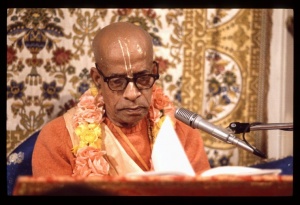SB 9.16.23

A.C. Bhaktivedanta Swami Prabhupada
TEXT 23
- tataś cāvabhṛtha-snāna-
- vidhūtāśeṣa-kilbiṣaḥ
- sarasvatyāṁ mahā-nadyāṁ
- reje vyabbhra ivāṁśumān
SYNONYMS
tataḥ — thereafter; ca — also; avabhṛtha-snāna — by bathing after finishing the sacrifice; vidhūta — cleansed; aśeṣa — unlimited; kilbiṣaḥ — whose reactions of sinful activities; sarasvatyām — on the bank of the great river Sarasvatī; mahā-nadyām — one of the biggest rivers in India; reje — Lord Paraśurāma appeared; vyabbhraḥ — cloudless; iva aṁśumān — like the sun.
TRANSLATION
Thereafter, having completed the ritualistic sacrificial ceremonies, Lord Paraśurāma took the bath known as the avabhṛtha-snāna. Standing on the bank of the great river Sarasvatī, cleared of all sins, Lord Paraśurāma appeared like the sun in a clear, cloudless sky.
PURPORT
As stated in Bhagavad-gītā (BG 3.9), yajñārthāt karmaṇo 'nyatra loko 'yaṁ karma-bandhanaḥ: "Work done as a sacrifice for Viṣṇu has to be performed, otherwise work binds one to this material world." Karma-bandhanaḥ refers to the repeated acceptance of one material body after another. The whole problem of life is this repetition of birth and death. Therefore one is advised to work to perform yajña meant for satisfying Lord Viṣṇu. Although Lord Paraśurāma was an incarnation of the Supreme Personality of Godhead, he had to account for sinful activities. Anyone in this material world, however careful he may be, must commit some sinful activities, even though he does not want to. For example, one may trample many small ants and other insects while walking on the street and kill many living beings unknowingly. Therefore the Vedic principle of pañca-yajña, five kinds of recommended sacrifice, is compulsory. In this age of Kali, however, there is a great concession given to people in general. Yajñaiḥ saṅkīrtana-prāyair yajanti hi sumedhasaḥ: (SB 11.5.32) we may worship Lord Caitanya, the hidden incarnation of Kṛṣṇa. Kṛṣṇa-varṇaṁ tviṣākṛṣṇam: although He is Kṛṣṇa Himself, He always chants Hare Kṛṣṇa and preaches Kṛṣṇa consciousness. One is recommended to worship this incarnation by chanting, the saṅkīrtana-yajña. The performance of saṅkīrtana-yajña is a special concession for human society to save people from being affected by known or unknown sinful activities. We are surrounded by unlimited sins, and therefore it is compulsory that one take to Kṛṣṇa consciousness and chant the Hare Kṛṣṇa mahā-mantra.